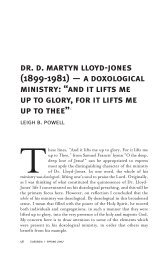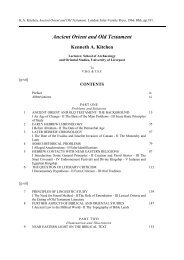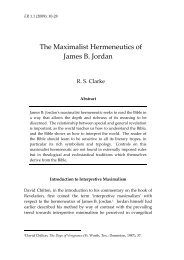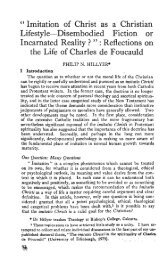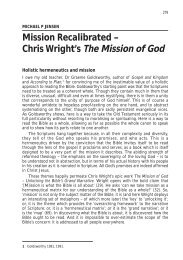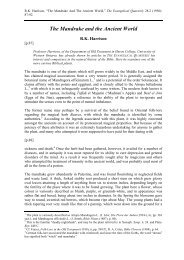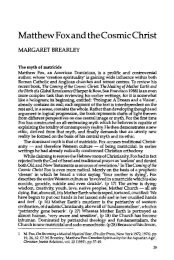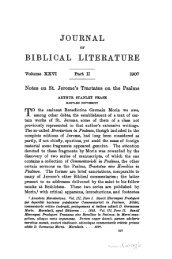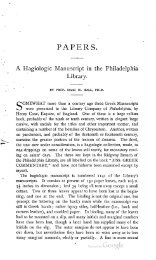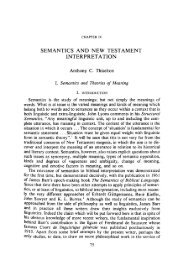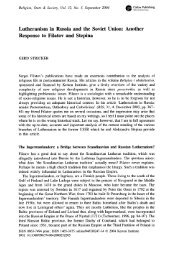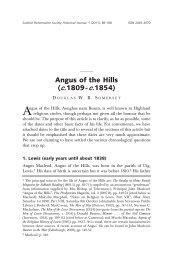The Language of the Epistle to the Hebrews as Bearing upon Its ...
The Language of the Epistle to the Hebrews as Bearing upon Its ...
The Language of the Epistle to the Hebrews as Bearing upon Its ...
You also want an ePaper? Increase the reach of your titles
YUMPU automatically turns print PDFs into web optimized ePapers that Google loves.
LANGUAGE OF THE EPISTLE TO THE HEBREWS.<br />
7<br />
and v'roo-rpewo are favorite words with S. Luke. <strong>The</strong> former occurs<br />
in his writings 34 times, is not found at all in Heb., is used by S. Paul<br />
i times, and only 4 times elsewhere; <strong>the</strong> latter is used by S. Luke<br />
31 times, and elsewhere is used only once in Heb., once by S. Paul,<br />
and once by S. Mark. On <strong>the</strong> o<strong>the</strong>r hand, KaTEpyCdOlOLa is a Pauline<br />
word (21 times), never used in Heb., and but 3 times elsewhere<br />
(J<strong>as</strong>. 2, Pet. i). <strong>The</strong> use <strong>of</strong> <strong>the</strong> comparatives Kpetlro-wv and 7rX<strong>to</strong>v<br />
with <strong>the</strong> superlative 7rX<strong>to</strong>-iros on <strong>the</strong> contrary is far more common in<br />
Heb. <strong>The</strong> comparative numbers are: for Kpetacawv Heb. I50;<br />
S. Luke, o; S. Paul, 7 (he also uses <strong>the</strong> adverb Kpeiacrov once); all<br />
o<strong>the</strong>rs, 2. For 7rXewv, 7rXeioros,<br />
Heb. 46; S. Luke, 42; S. Paul, 19;<br />
all o<strong>the</strong>rs, I 7.<br />
I do not recall any o<strong>the</strong>r words <strong>of</strong> this kind, <strong>the</strong> usage <strong>of</strong> which<br />
affects <strong>the</strong> point. <strong>The</strong> inferences <strong>to</strong> be drawn from this examination,<br />
if any, are somewhat contradic<strong>to</strong>ry. <strong>The</strong>y certainly do not point <strong>to</strong><br />
<strong>the</strong> authorship <strong>of</strong> this epistle by ei<strong>the</strong>r S. Luke or S. Paul <strong>as</strong> <strong>the</strong>y<br />
might be expected <strong>to</strong> do if such were <strong>the</strong> fact. <strong>The</strong>re are some<br />
striking similarities <strong>of</strong> diction; but <strong>the</strong> differences are at le<strong>as</strong>t quite<br />
<strong>as</strong> important.<br />
It is now time <strong>to</strong> consider those particles, adverbs, and prepositions<br />
which bring out <strong>the</strong> habits <strong>of</strong> expression <strong>of</strong> each writer. While it is<br />
not proposed <strong>to</strong> enter in<strong>to</strong> points <strong>of</strong> grammatical construction any<br />
far<strong>the</strong>r than <strong>the</strong>y are necessarily involved in <strong>the</strong> use <strong>of</strong> <strong>the</strong>se words;<br />
yet in considering <strong>the</strong>m, it is well <strong>to</strong> bear in mind that <strong>the</strong>re is a<br />
striking similarity <strong>of</strong> grammatical construction between S. Luke and<br />
<strong>the</strong> Ep. <strong>to</strong> <strong>the</strong> Heb. Every one in <strong>the</strong> study <strong>of</strong> <strong>the</strong> N. T. grammars<br />
must have observed how <strong>of</strong>ten reference is made <strong>to</strong> this fact. Buttmann,<br />
e.g. (? I30, p. I42),1 remarks in regard <strong>to</strong> a certain construction,<br />
" <strong>the</strong> language <strong>of</strong> <strong>the</strong> N. T. however, especially that <strong>of</strong> Luke and <strong>of</strong><br />
<strong>the</strong> Ep. <strong>to</strong> <strong>the</strong> Heb., is not so far removed from <strong>the</strong> ordinary Greek<br />
<strong>as</strong> not <strong>to</strong> avail itself <strong>of</strong> this advantage." Again, he speaks <strong>of</strong> ano<strong>the</strong>r<br />
cl<strong>as</strong>sical construction (? I44, p. 299) <strong>as</strong> having " in <strong>the</strong> N. T. in <strong>the</strong><br />
c<strong>as</strong>e <strong>of</strong> XavOdvetv and its <strong>as</strong>sociated verbs almost completely disappeared,<br />
only a few instances <strong>of</strong> it being adducible (almost exclusively<br />
from Luke and <strong>the</strong> Ep. <strong>to</strong> <strong>the</strong> Heb.)." Again, speaking<br />
<strong>of</strong> /uv ... 8e, he says, "In <strong>the</strong> use <strong>of</strong> <strong>the</strong>se two particles <strong>the</strong> N. T.<br />
writers, especially Luke, <strong>the</strong> author <strong>of</strong> <strong>the</strong> Ep. <strong>to</strong> <strong>the</strong> Heb., and<br />
Paul, are by no means unpractised." Similar observations are<br />
frequent. Delitzsch h<strong>as</strong> collected in his commentary on <strong>the</strong> epistle<br />
1 Buttmann's Gram. <strong>of</strong> N. T. Greek, translatedr etc., by J. H. Thayer.




